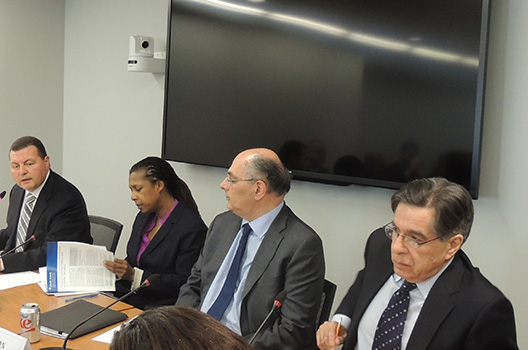 On Thursday, March 12, 2015, the Atlantic Council’s Rafik Hariri Center for the Middle East released “Morocco’s Gradual Political and Economic Transition,” its latest publication by Senior Fellow Karim Mezran and Nonresident Senior Fellow Mohsin Khan. The report explores how Morocco managed to avoid political and economic instability in the midst of the Arab Spring and what reforms are needed to keep it on a path toward economic growth and political openness.
On Thursday, March 12, 2015, the Atlantic Council’s Rafik Hariri Center for the Middle East released “Morocco’s Gradual Political and Economic Transition,” its latest publication by Senior Fellow Karim Mezran and Nonresident Senior Fellow Mohsin Khan. The report explores how Morocco managed to avoid political and economic instability in the midst of the Arab Spring and what reforms are needed to keep it on a path toward economic growth and political openness.
The Center hosted a roundtable discussion featuring Dr. Adnan Mazarei, Deputy Director for the Middle East and Central Asia at the International Monetary Fund, and Dr. Audra Grant, Senior Researcher and Manager with the University of Chicago’s National Opinion Research Center.
Mazarei focused on the economic reforms and policies needed to stimulate growth in Morocco, emphasizing the need for inclusive growth. Mazarei said that despite progress in integration with Europe and an increase in foreign direct investment, poverty, gender inequality, and income distribution issues persist. He argued for policies that would increase participation of women and youth in the workforce, in part by appropriately reforming and funding social programs that improve education.
Commenting on the political scene in Morocco, Grant explained that the government had enacted a longer timeline of reforms than other regional states and that this reduced the prevalence of zero sum politics. Grant pointed to reforms aimed at increasing inclusion of women and youth in government and increasing the role of the parliament. However, she noted that these efforts have not empowered government institutions with more expansive roles or greater importance than the monarchy. Grant singled out corruption and interest groups, which often block or delay reforms, underscoring the prevalent patronage system. She also said that citizen participation needs to increase, especially among women and youth.
Turning to Morocco’s vision for the future, Khan explained that it needs to diversify its economy away from its dependence on agriculture and turn to higher value, more sustainable products. In his opinion, Morocco aims to have a similar economy as the smaller southern European states. However, the status quo constituencies will continue to resist the requisite reforms needed for Morocco to fully expand its economic and political potential. The panelists and participants also discussed the issues of subsidies, how to generate inclusive growth, and the need to equip Morocco’s labor force with skills in demand.
For an in-depth assessment and analysis of Morocco’s political and economic situation, please read Mezran and Khan’s latest publication here.
